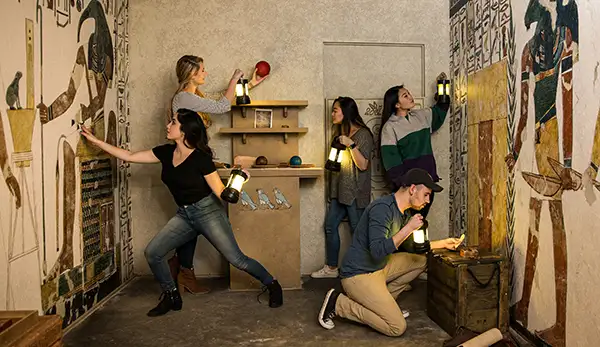Best Escape Room Experience-- Exciting Games and Puzzles for Teams
Best Escape Room Experience-- Exciting Games and Puzzles for Teams
Blog Article
Team Strategies: Exactly How to Team up Efficiently in a Getaway Room
Browsing the complexities of a retreat space demands more than plain interest; it needs a well-coordinated technique based in clear communication, critical role tasks, and adept time administration. Teams should actively listen per member's understandings, appoint functions that align with private staminas, and maintain routine check-ins to make certain emphasis and protect against redundancy. By promoting an atmosphere that values cohesion and flexibility, groups can considerably heighten their efficiency and success rates. The nuances of these techniques can transform the experience, yet how specifically can they be implemented to maximize the potential for success?
Establish Clear Communication

To facilitate clear interaction, it is important to mark a main point of get in touch with for info dissemination. Brief, focused updates from each team member can maintain the team notified without overwhelming them with details.

Appoint Functions Purposefully
While clear interaction sets the foundation for efficient team effort, assigning functions purposefully makes certain that each staff member's staminas are utilized successfully. In an escape space scenario, the time-sensitive and intricate nature of obstacles requires a well-organized strategy to task delegation. By determining and leveraging individual competencies, teams can enhance their problem-solving capabilities and improve general efficiency.
First, examine the unique abilities and qualities of each participant. As an example, someone with an eager eye for detail may master locating covert things, while a logical thinker can be much better suited to resolving challenges - best escape room. It's just as essential to have a leader who can supervise development, take care of the timeline, and make crucial phone calls when essential. This function typically calls for solid business and social abilities.
Second, make sure that duties are adaptable and versatile. As new difficulties arise, the team needs to have the ability to pivot, reallocating jobs as required. This flexibility assists preserve momentum and click protects against bottlenecks that might take place due to rigid function tasks.
Ultimately, a strategic method to role assignment not just maximizes the toughness of each group participant however also promotes a natural setting, driving the group in the direction of an effective escape.
Make Use Of Diverse Abilities
Identifying and harnessing the diverse skills within your group can substantially raise your efficiency in an escape space. Each group member brings distinct staminas to the table, and successfully leveraging these capacities can expedite analytic and enhance total performance. For instance, a group participant with solid logical abilities might excel at deciphering complicated codes or patterns, while another with keen observational capacities may rapidly spot hidden ideas that others might overlook.
Efficient interaction is vital to using these diverse skills. Urge employee to articulate their insights and concepts without delay, making More about the author certain that all prospective services are taken into consideration. This comprehensive strategy promotes a vibrant environment where creative thinking and critical reasoning can prosper. In addition, appointing tasks that line up with each participant's toughness can protect against traffic jams and make sure that progress is constant.
Additionally, diversity in abilities frequently translates to variety in assuming designs, which is vital in an escape room setting. While some difficulties might require rational thinking and precision, others might gain from creative and association of ideas. By recognizing and leveraging this variety, groups can attend to a more comprehensive variety of difficulties a lot more successfully, therefore enhancing their opportunities of an effective retreat.
Manage Time Properly

Recognize visible puzzles and split jobs based on group participants' staminas, guaranteeing that no one is idle. This practice can help keep the group focused and prevent time from sliding away unnoticed.
In addition, prevent tunnel vision. If a challenge is taking too long, turn group participants or carry on to an additional obstacle, returning later with fresh perspectives. Interaction is critical-- keep everybody upgraded on addressed problems and remaining tasks to avoid redundant efforts.
Last but not least, use any kind of hints or clues moderately but strategically - best escape room. Understanding when to ask for assistance can save beneficial time. By adhering to these time monitoring principles, teams can substantially boost their possibilities of an effective and satisfying retreat space experience
Debrief and Mirror
Reflection is an important facet of group development and renovation in the context of retreat spaces. As soon as the difficulty is completed, whether effectively or otherwise, it is crucial for the team to participate in a structured debriefing session. This process permits employee to examine their efficiency, recognize toughness, and pinpoint locations for improvement.
Begin helpful hints the debrief by discussing what went well. Highlight specific circumstances of efficient communication, analytic, and collaboration. Acknowledging these favorable actions strengthens them and encourages their repetition in future difficulties.
Following, address the obstacles encountered. Review moments of confusion, miscommunication, or ineffective approaches. Encourage an open and constructive discussion where team members can share their point of views without fear of objection. This fosters a society of continuous improvement and discovering.
Final Thought
In conclusion, effective partnership in an escape area is predicated upon clear communication, strategic role projects, the efficient utilization of varied skills, and skilled time management. By creating a cohesive and adaptive group environment, the possibility of successfully resolving puzzles and accomplishing the purpose of getting away the space is substantially improved.
Report this page